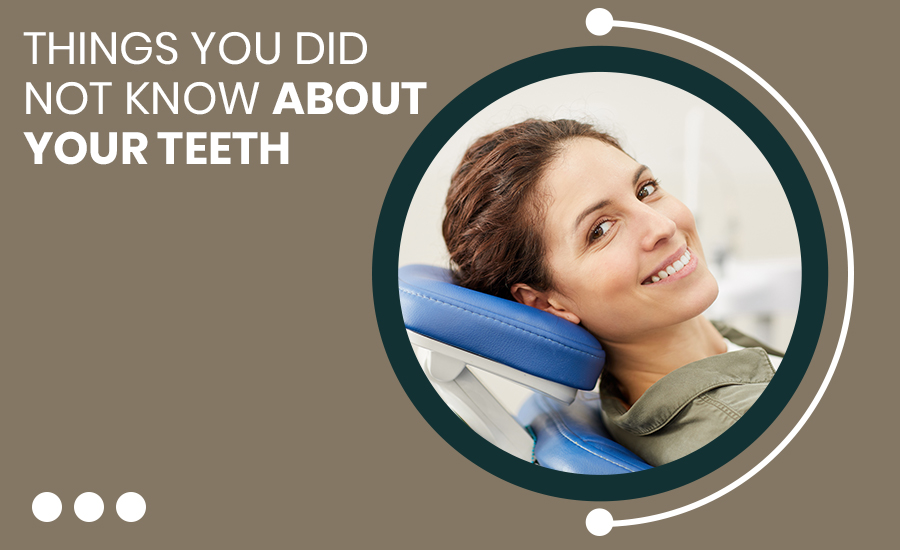Dental care has been around for long, longer than we can possibly know. For example, some of us do not know that toothpaste has been in use since 500B.C. The difference, however, was that the toothpaste used then was very different from the one we use now. The ancient Greeks, for example, used a mixture containing coral powder and iron rust as their toothpaste. As for toothbrushes, it was just a bunch of tree twigs that people chewed on. Fortunately, there has been a lot of improvement regarding dental care, and we have tools that have made dental care easy for us.
Your teeth is what you rely on daily for several activities involving talking and eating. Because of this, it is important that you expose yourself to all kinds of knowledge about them and how best to take care of them. You can contact Dr. Sogol Mousavi at our clinic on ways to take good care of your teeth. Meanwhile, below are 10 things you did not know about your teeth.
1. Your teeth are yours, and yours alone
Your teeth are yours exclusively. This means that no other person has your teeth. Just like every individual has a unique set of fingerprints, the same thing applies to the dentition. This is why humans can be identified by their dental records. Additionally, your tongue has a unique tongue print.
2. Your teeth are a little bit similar to icebergs
Keeping your gums healthy is as important as keeping your teeth healthy. This is because about one-third of your teeth are underneath your gums. An indication of a healthy gum is it being pink in colour and firm.
3. Your teeth are 32 in number
Altogether, the teeth are 32 in number. It includes 12 molars, 8 premolars, four canines, and eight incisors. These different teeth are arranged in the mouth from the back to the front, both in the upper and lower jaw.
4. The enamel of the teeth is the hardest object in your body
The outermost layer of the teeth is known as the enamel. The primary purpose of the enamel is to protect the tooth. It is made of calcium and phosphate, just like the bones; however, it is stronger because there are other proteins and crystallites inside it.
5. Your teeth is not exactly indestructible
Although the enamel is hard and is meant to protect the teeth from damage, it is not exactly indestructible on its own. It is vulnerable to chips and cracks and can also be exposed to decay. When the enamel is exposed to acids and bacteria in the mouth and from soft drinks, it becomes vulnerable, and decay sets in. The decaying process is quickened when carbonated soft drinks are consumed regularly or daily.
6. The colour yellow is not a good sign
When your teeth start to appear yellow, it could be a bad sign. The enamel partly contributes to the white appearance of the teeth. This means that the decay of the enamel causes the yellow appearance of the teeth. If there is any pain alongside the yellow appearance of the teeth, it could mean that the decay has eaten deeper than you may know.
7. The dentin continues to grow while the enamel does not
The teeth are made of different layers. The layer lying beneath the enamel is the dentin, and it is also a very hard substance. It transports nutrition and transmits nerve signals through the tooth through small channels. The dentin is of three types, and they are primary, secondary, and reparative. Unlike the enamel that remains static, the dentin grows continuously and changes throughout the course of one’s life.
8. About 300 types of bacteria live in the mouth
About 200 or 300 different species of bacteria contribute to plaque. Although several types of bacteria live in the mouth, they become toxic and react with the food we eat, giving rise to dental plaque. The major reason why plaque develops in the mouth is as a result of poor oral hygiene.
9. Dental plaque is the enemy
Dental plaque does not just set in the mouth. It develops gradually when you do not brush and floss regularly. Regular brushing and flossing removes them and prevents them from becoming white and sticky. If they are not removed, they harden into a new material known as tartar. To get rid of them, you must brush regularly and floss regularly as well. Also, see your dentist at regular intervals for deep cleaning.
10. You produce about 10,000 gallons of spit
Every day, you produce about a quart of saliva. This adds up to 10,000 gallons throughout your lifetime. Saliva is important in the mouth because it contains enzymes that kick-start the process of digestion, lubricates the mouth, thereby making it easier for food to go down. It is there to wash away any food particles that linger on the teeth after eating. One of its most important functions is to neutralise the acids present in plaque.Visit us at St. Albans Dental Clinic for more helpful information, or contact our Dr. Mousavi dentist directly for help. Get in touch with us through email or direct calls.



